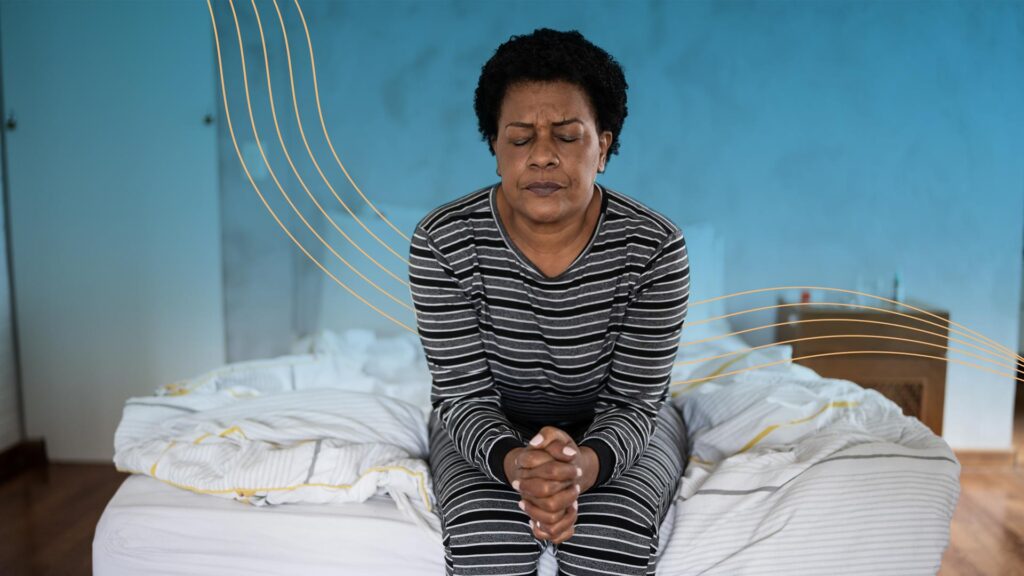
Some of the links on this page may link to our affiliates. Learn more about our ad policies.
What Happens if You Don’t Deal with Trauma?

Trauma can be a life-altering event that has long-lasting effects. It’s not something to take lightly, and it’s important to deal with it in an appropriate manner. But what happens if you don’t? Unresolved trauma can have serious physical, psychological, and emotional consequences, including depression, anxiety, PTSD, and even physical health complications. Online therapy can be a solution for those who may not have access to a therapist, or just prefer the privacy of their own home.
Definition of Trauma
Trauma is a term used to describe the psychological and emotional distress caused by experiencing or witnessing a life-threatening, or otherwise distressing event. It can cause a range of mental health issues, such as depression, post-traumatic stress disorder (PTSD), anxiety, and physical health complications. Trauma can take shape in many forms such as physical abuse, sexual assault, natural disasters, accidents, or the death of someone close to you. It is important to remember that everyone experiences trauma differently and no two people will have the same reaction. Regardless of the situation in which it occurred, it’s important to seek help if you feel like you are struggling with unresolved trauma. Online therapy can provide various treatments designed to help individuals heal from their traumatic experiences and move forward with their lives.
Types of Trauma
There are many different types of trauma. Some common types include physical, emotional, sexual, and psychological abuse; domestic violence; childhood neglect and abandonment; natural disasters; war or acts of terror; serious accidents or injury; and death or the loss of a loved one. It is important to remember that everyone experiences trauma differently, so it is important to recognize the individual needs of each person. It can sometimes be difficult to identify trauma in yourself or in those around you as symptoms may vary from person to person. Common signs of unresolved trauma include difficulty sleeping, nightmares, flashbacks, avoiding triggers, unexplained headaches or body pains, mood swings, and depression. If any of these symptoms persist for longer than a few weeks it is important to seek help from a mental health professional who can help you process your traumatic experience in a safe environment and provide resources to ensure your recovery.
Symptoms of Trauma
Symptoms of trauma can manifest in many ways, and no two people will experience them identically. Common signs of unresolved trauma include difficulty sleeping, nightmares, flashbacks, avoiding triggers, unexplained headaches or body pains, mood swings, and depression. Other symptoms may include hypervigilance and an exaggerated startle response as well as feelings of guilt or shame. People with unresolved trauma may also feel irritable or easily angered, have difficulty concentrating and making decisions, or be prone to self-destructive behaviors such as substance abuse. It is important to recognize these symptoms early on so that you can receive the help you need from a mental health professional who can provide resources for recovery.
Unresolved Trauma
Unresolved trauma is the result of not dealing with difficult life experiences and can have a significant impact on mental health. If not addressed, trauma can manifest in many ways such as difficulty sleeping, nightmares, flashbacks, avoiding triggers, unexplained headaches or body pains, mood swings, and depression. Other symptoms may include hypervigilance and an exaggerated startle response as well as feelings of guilt or shame. People with unresolved trauma may also feel irritable or easily angered, have difficulty concentrating and making decisions, or be prone to self-destructive behaviors such as substance abuse. It is important to recognize these signs early on so that you can seek out the appropriate help from a qualified mental health professional who can provide you with resources for recovery.
What is Unresolved Trauma?
Unresolved trauma is a psychological condition that occurs when a person has not adequately dealt with difficult life experiences. This type of trauma can cause a variety of symptoms, including difficulty sleeping, nightmares, flashbacks, avoiding triggers, unexplained headaches or body pains, mood swings, and depression. People with unresolved trauma may also experience hypervigilance and an exaggerated startle response as well as feelings of guilt or shame. It is important to recognize these signs early on in order to seek professional help from a qualified mental health professional who can provide the appropriate resources for recovery. Unresolved trauma can be debilitating and have long-lasting effects on one’s mental health if not properly addressed.
What Can Unhealed Trauma Look Like?
Unhealed trauma can manifest in numerous ways, both physically and psychologically. Physically, those with unresolved trauma may experience unexplained headaches or body pains, difficulty sleeping, exhaustion, and an increased startle response. Psychologically, they may experience depression, mood swings, irritability, avoidance of triggers, and flashbacks to traumatic events. They may also feel a heightened sense of fear and anxiety as well as guilt or shame over past experiences. It is important for individuals to recognize these signs early on in order to seek the help of a qualified mental health professional who can provide the appropriate resources for recovery. Unresolved trauma can have long-lasting effects on one’s mental health if not properly addressed.
Problems with intimacy, Trust, and Control are Tell-tale Signs of Trauma
Problems with intimacy, trust, and control are tell-tale signs of trauma, as many in our society have experienced emotional abuse or physical assault in their life. Even without a diagnosed mental disorder, simply going through a traumatic experience can lead to the significant psychological damage that yields symptoms resembling Post-Traumatic Stress Disorder (PTSD).
However, having gone through a traumatic event —or having endured a lifetime of adversity—the magnitude of pain due to lack of security and stability can be overwhelming. Those struggling with any issues related to intimacy, trust, control, or safety may feel additional distress as this sense of helplessness.
Unresolved trauma can have a significant impact on intimacy in a variety of ways. Trauma can cause individuals to experience feelings of shame, fear, and vulnerability, which can make it difficult to form close, trusting relationships with others.
- Trust issues: Trauma can cause individuals to have difficulty trusting others, particularly in intimate relationships. They may be hesitant to open up or be vulnerable, fearing that they will be hurt or rejected.
- Emotional distance: Trauma can cause individuals to withdraw emotionally as a way of protecting themselves from further harm. This emotional distance can make it challenging to form deep connections with others and can lead to feelings of isolation and loneliness.
- Difficulty with physical intimacy: Trauma can also affect an individual’s ability to be physically intimate with another person. For example, they may struggle with sexual intimacy, feeling uncomfortable or disconnected during these moments.
It’s important to note that the impact of trauma on intimacy is complex and can vary significantly depending on the individual and their specific experiences. Seeking support from a mental health professional who specializes in trauma can be an essential step in working through these challenges and improving intimacy.
Effects of Unresolved Trauma
Unresolved trauma can have devastating effects on a person’s physical and mental well-being. Not only can it lead to psychological distress, such as depression, anxiety, and flashbacks, but it can also cause physical symptoms like headaches and fatigue. Unfortunately, these concerns often go unrecognized or ignored for long periods of time. This can have an extreme impact on one’s quality of life and lead to further complications if not properly addressed.
It is important for those affected by unresolved trauma to be aware of the potential consequences that may arise over time. If individuals feel they may be struggling with unresolved trauma, they should reach out to a qualified therapist who can provide appropriate resources and strategies for recovery. With the right guidance and support, individuals can learn how to manage their symptoms and move toward healing in a safe environment.
More Information On Dealing With Trauma
What Does Online Therapy Treat?
The Benefits of Pets for Older Adults
Steps You Can Take To Reduce Depression in Your Senior Years
Disordered Eating and Older Adults
Mindfulness-Based Stress Reduction as Powerful as Lexapro
The 3 Best Online Therapy Platforms for Anxiety
Causes of Unresolved Trauma
Unresolved trauma is often caused by experiences of severe psychological or physical stress. This could include overwhelming events like war, abuse, neglect, natural disasters, sexual abuse, and unexpected losses. Even seemingly minor events can result in trauma if the individual was not able to process the event effectively at the time. In addition, unresolved trauma can be passed down from one generation to the next if it is not addressed appropriately.
It is important for individuals to recognize when they may be experiencing symptoms of unresolved trauma so that they can seek help and begin trauma recovery as soon as possible. Otherwise, these issues can become increasingly difficult to manage and lead to further complications in the future. With appropriate treatment and support from a mental health professional, individuals can learn how to cope with their symptoms and move toward healing so that they can live healthy and fulfilling life once again.
What Are the Signs of Trauma Blocking?
Signs of trauma blocking are often subtle and easy to miss. These signs may include difficulty concentrating, difficulty with emotional regulation, feeling overwhelmed or anxious in response to triggers that remind the individual of past traumas, avoiding activities or conversations that bring up thoughts of traumatic events, or overall feelings of numbness and detachment from people and activities.
Additionally, individuals experiencing trauma blocking may also manifest physical symptoms such as headaches, stomachaches, sleep disturbances, changes in appetite, and increased sensitivity to sound or touch.
If these signs are present for an extended period of time without any apparent cause, it is important to seek professional help in order to diagnose and treat any underlying unresolved trauma. With proper treatment and support from a mental health professional, individuals can learn how to process their experiences in a healthy way and heal from the effects of trauma blocking.
Mental Health Professionals and Treatment Options
Mental health professionals provide a safe, non-judgmental environment in which trauma survivors can explore their trauma experiences and begin the healing process. Treatment options may include individual or group therapy, Eye Movement Desensitization and Reprocessing (EMDR), Cognitive Behavioral Therapy (CBT), Dialectical Behavioral Therapy (DBT), and other evidence-based therapies. Additionally, medications may be prescribed to help manage symptoms of other mental health conditions such as anxiety and depression. A trauma expert is a mental health professional experienced in working with trauma survivors who can provide an individualized treatment plan tailored to specific needs, and help them to learn healthy coping skills and process their experiences in a way that promotes understanding and growth.
Substance Abuse and Mental Health Services Administration (SAMHSA)
The Substance Abuse and Mental Health Services Administration (SAMHSA) is a division of the U.S. Department of Health and Human Services that provides leadership and resources to support mental health systems, services, and programs nationwide. The MHSA works to ensure that individuals with mental illness have access to comprehensive services in their communities and strives to reduce the burden of mental illness-related disabilities on society. To achieve this goal, it funds evidence-based programs such as research initiatives, training & technical assistance, suicide prevention activities, emergency crisis response systems, peer support networks, and more. Through its efforts and resources, the SAMHSA is dedicated to improving access to quality mental health care so that individuals can receive personalized treatment plans tailored to meet their needs.
Exposure Therapies
Exposure therapies are a type of psychotherapy used to treat mental disorders and trauma responses such as posttraumatic stress disorder (PTSD) and phobias. These treatments involve exposing the patient to the fear or trauma-related object or experience in a safe, controlled environment. The goal is to reduce the individual’s fear response and associated symptoms by teaching them more effective ways of managing their anxiety.
During an exposure therapy session, the therapist will gradually introduce stimuli that provoke painful memories or a fear response and guide the patient through coping strategies such as deep breathing exercises and positive self-talk. Over time, these techniques can help patients habituate to fearful situations and eventually overcome their fears and traumatic memories altogether. Exposure therapies are considered one of the most effective treatments for PTSD and other mental health issues, though they require a significant commitment from both the patient and therapist in order to be successful.
Sense of Control Strategies
Sense of control strategies are a type of psychotherapy used to treat mental disorders such as posttraumatic stress disorder (PTSD) and phobias. These treatments involve teaching the patient coping skills and techniques that allow them to gain control and a sense of power over their fear or trauma-related experience in a safe, controlled environment. The goal is to reduce the individual’s fear response and associated symptoms by helping them identify and manage triggers, practice mindfulness, and develop better ways of responding to stressful situations.
During a sense of control therapy session, the therapist will guide the patient through various activities such as relaxation exercises, positive self-talk, goal setting, and visualization techniques. Sense of control strategies is considered an effective treatment for PTSD and other mental health issues when combined with other tools such as exposure therapies.
Physical Symptoms Caused by Unresolved Trauma
Physical symptoms caused by unresolved trauma can be debilitating and can lead to a range of long-term health issues. Common physical symptoms include pain, headaches, digestive problems, fatigue, muscle tension, insomnia, and dizziness. These physical manifestations can often take on a life of their own and persist even after the original trauma is addressed.
In addition to physical distress, unresolved trauma can also cause emotional distress such as anxiety and depression which can further exacerbate these physical symptoms. It is important to recognize that unresolved trauma may cause physical distress reactions that need to be addressed in order for an individual to heal both physically and emotionally. Professional treatment such as talk therapy or cognitive behavioral therapy is often recommended in order to work through the underlying causes of the trauma and develop effective coping strategies for dealing with its effects.
Physical Health Complications Caused by Unresolved Trauma
Unresolved trauma can lead to a range of physical health complications beyond the common symptoms listed above. Long-term issues can include an increased risk of developing chronic illnesses such as heart disease, stroke, and diabetes. Additionally, unresolved trauma can weaken the immune system and make individuals more susceptible to infection and other illnesses.
Unresolved trauma has been linked to an increased risk of substance abuse and addiction as individuals may use drugs or alcohol to cope with the overwhelming emotions associated with their trauma. It is important for individuals who are struggling with unresolved trauma to seek professional help in order to prevent long-term physical health complications from developing or worsening. Treatment options like cognitive behavioral therapy have helped many people successfully manage their symptoms and live healthier lives.
Emotional Reactions to Unresolved Trauma
Unresolved trauma can often lead to a wide range of emotional reactions such as feelings of sadness, fear, guilt, and shame. Individuals may also experience feelings of helplessness or hopelessness. Additionally, unresolved trauma can lead to difficulty regulating emotions, particularly intense anger, and frustration which can have an impact on relationships. Unresolved trauma can even cause individuals to become more withdrawn or isolated as they struggle with their emotions. It is important for those struggling with unresolved trauma to seek professional help in order to manage their emotional reactions and prevent these symptoms from becoming more severe or impacting other areas of life.
Treatment options such as psychotherapy are effective at helping individuals process the traumatic event in a safe and supportive environment while learning coping skills that will enable them to better regulate their emotions in the future.
Post-Traumatic Stress Disorder (PTSD)
Post-Traumatic Stress Disorder (PTSD) is an anxiety disorder that develops after someone has experienced or witnessed a traumatic event. Symptoms of PTSD can include intrusive memories, flashbacks, nightmares, difficulty sleeping, and avoidance of activities or places that remind the individual of the traumatic event. Unresolved PTSD can also create substance use disorders, creating co-occurring disorders that need to be addressed.
Treatment options such as cognitive-behavioral therapy and medication can be effective at helping individuals process the traumatic event in a safe and supportive environment while learning coping skills that will enable them to better regulate their emotions in the future. Additionally, support groups can provide a safe space for individuals dealing with the complex trauma of PTSD to connect with one another and share experiences.
Depression and Anxiety from Unresolved Trauma
Reactions to trauma can also manifest as depression. It is important to take steps to process the experience and address any lingering emotions or thoughts that may arise in order to avoid developing depression or anxiety. It is not uncommon for individuals with unresolved trauma to become overwhelmed by their own emotions, causing them to feel hopeless and helpless in many situations. If left untreated, depression and anxiety can worsen over time, leading to further impairments in functioning such as difficulty concentrating, lack of motivation, feelings of worthlessness, irritability, and difficulty sleeping.
Why Do People Smile When Talking About Trauma?
Trauma is a difficult and often painful experience, but it can also be an opportunity for growth and healing. For many clients, the act of talking about their trauma can be cathartic and allow them to move forward in their lives. Smiling while talking about traumatic experiences may seem counterintuitive, but it’s actually a quite common response to trauma. It is important to understand that clients are not necessarily trying to ignore or minimize the pain they have experienced by smiling; rather, they are expressing relief at being able to express themselves without judgment or fear of reprisal. Additionally, smiling may signify that the client has reached an emotional breakthrough in processing their trauma and is now able to look towards the future with hope. In any case, it is important for therapists to recognize that different clients may express themselves differently when discussing traumatic events, so it’s important to remain open-minded and supportive when doing so.
How do you let go of unhealed trauma?
The process of letting go of unhealed trauma can be a difficult and often lengthy journey. It involves understanding your emotional responses, recognizing the triggers that cause these feelings, and developing coping skills to regulate them. Additionally, it requires facing the pain of the trauma head-on and seeking out professional help when needed. This might include talking to a therapist or joining a support group with people who understand what you’re going through. Your healing process should also include self-care activities such as mindfulness meditation, journaling, exercising, and spending time in nature. As you work through your trauma, remember to be gentle with yourself and take things one step at a time. With patience and dedication, you can learn how to let go of unhealed trauma and move forward in an easy daily life.
Content on this site is for reference and information purposes only. Do not rely solely on this content, as it is not a substitute for advice from a licensed healthcare professional. Aging.com assumes no liability for inaccuracies. Consult with your doctor before beginning any medications or programs.



